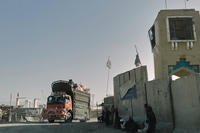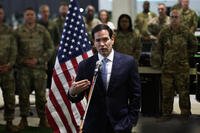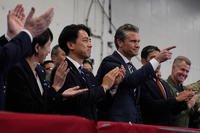Retired Marine Corps Lt. Gen. Richard P. Mills served as commander of NATO's Regional Command Southwest in Afghanistan from 2010 to 2011. He was a participant of the Jewish Institute for National Security of America (JINSA) Generals and Admirals program to Israel in 2019.
Even as much of the world shuts down because of the novel coronavirus, terrorism continues in Afghanistan. These attacks reinforce that the recent deal between the United States and the Taliban is a disappointing chapter of America's war on terror. The hope is that this deal will wind down the U.S. military presence in exchange for stability. However, significant diplomatic and counterterrorism steps are necessary to ensure that Afghanistan does not again become a safe harbor for terrorists who can strike the American homeland.
In the short term, the coronavirus is forcing America's military to adapt. The Pentagon hopes to avoid spreading the virus and is freezing all troop movements until the end of May. However, the Department of Defense does not believe that the pandemic will prevent the reduction of troops in Afghanistan to 8,600 within 135 days of last month's agreement.
The United States agreed as part of the deal to withdraw all forces in 14 months if the Taliban abides by its obligations. American troops currently in Afghanistan train and assist partners. Unlike during the peak fighting of the war, the United States does not conduct large combat operations or deploy a massive number of troops in the country.
Further complicating matters, Afghanistan currently has two leaders claiming to be president. Ashraf Ghani, the winner of the September 2019 election, faces opposition from Abdullah Abdullah. Ghani has served as Afghanistan's president since a similarly contested election in 2014, while Abdullah was CEO of the Unity Government until March 2020. Both Ghani and Abdullah held competing inauguration ceremonies in March.
However, the political dispute is a temporary setback to America's withdrawal plans. Only days after the United States threatened to cut aid by $1 billion because of a negotiating stalemate, both agreed to a limited prisoner exchange and to "further discussions." Some form of power-sharing agreement is the most likely political settlement.
Iran and Pakistan will continue competing with the United States for influence within Afghanistan. Both countries share borders with Afghanistan and have longstanding relationships there that reinforce their long-term commitment to shaping the country. Pakistan's support for the Taliban and Iran's proxy forces have been the main drivers behind the region's instability.
Regardless of any political settlement, Afghanistan's current political and military institutions are unlikely to prevent the Taliban from returning to power without an American military presence. The United States and its partners have made great strides to improve good governance and military practices.
When I was commander of NATO's Regional Command Southwest in Afghanistan from 2010 to 2011, a surge of troops brought Afghanistan to the precipice of long-term success. Since the end of the surge, there has been a trend in Afghanistan, Iraq, Syria and elsewhere toward withdrawing American forces abroad. These regrettable withdrawals have allowed adversaries to fill the vacuum left in the wake and will continue to endanger U.S. interests.
With further withdrawals from Afghanistan and a Taliban resurgence, America's work to promote good governance and foster partners would unwind. The improvement of women's rights has been one of the most critical developments to increase Afghanistan's quality of life. It has inoculated portions of the populace toward siding with the repressive Taliban. America's current partners will suffer as the Taliban, Pakistan and Iran gain influence.
With a broken cease-fire and little to no international coalition presence to stop the Taliban or other adversaries, Afghanistan in 2025 could look like it did in 2003. Even if the Taliban leadership supports the cease-fire, it lacks the command and control to prevent its subordinates from violating it.
The United States should prepare to engage with a future Afghanistan government where the Taliban has considerable influence. Leaders should look to the example of the working relationship that America shares with Vietnam even after the communist takeover.
The most dangerous potential breakdown of future relations would be if the Taliban again decided to support terrorists. Most likely, the Taliban would avoid repeating the mistake of openly admitting to aiding terrorist groups. Instead, they may quietly support them while also reaping the gains of being in governance.
Washington will need to send clear signals to Kabul about what it will and will not tolerate from the Taliban. Violating the cease-fire should halt any further concessions or withdrawals. Once troops withdraw, Washington's visibility into the country and ability to respond to aggression will decrease significantly.
Moving forward, U.S. diplomats, military leaders and intelligence officials should deepen relationships with whatever government takes shape in Afghanistan. To the greatest extent possible, America should leave some soldiers in Afghanistan to help train and assist the Afghanistan military. If the Taliban is still unwilling or unable to uphold its end of the bargain by reducing violence, the United States should not withdraw further forces.
Neither the coronavirus nor continuing terrorist attacks have changed the U.S. calculus about withdrawing from Afghanistan. The current deal with the Taliban is unwise. However, American policymakers should prepare to maximize their relationships and leverage with Afghanistan's leaders, whomever they may be. Withdrawing too soon or without proper preparation could unwind years of hard-fought victories that have cost American lives and dollars.
-- The opinions expressed in this op-ed are those of the author and do not necessarily reflect the views of Military.com. If you would like to submit your own commentary, please send your article to opinions@military.com for consideration.















